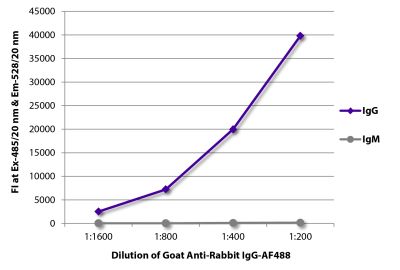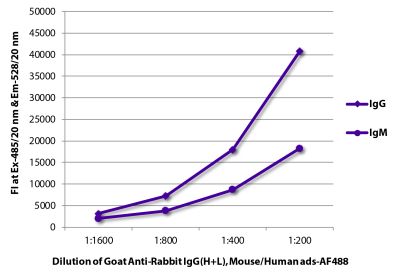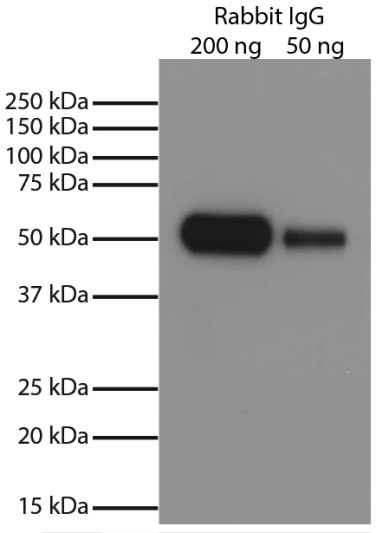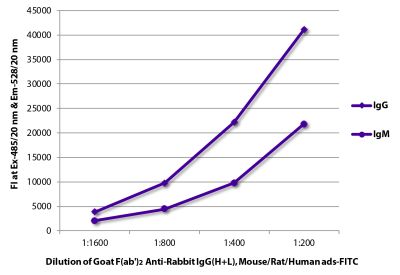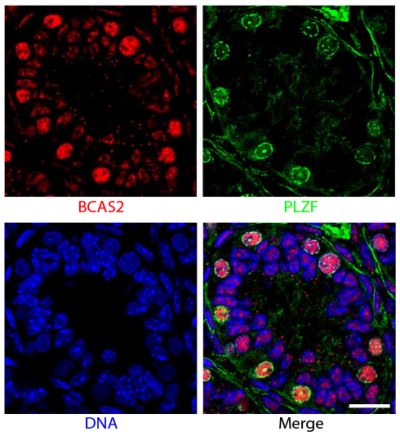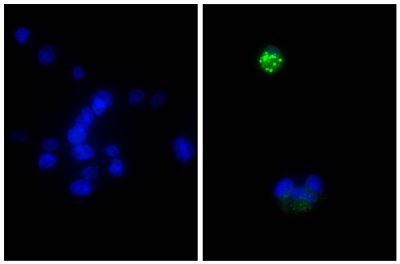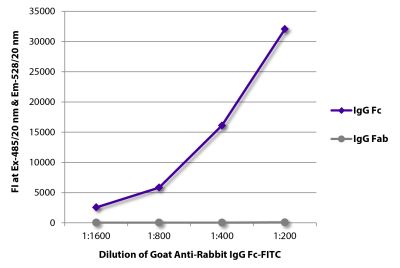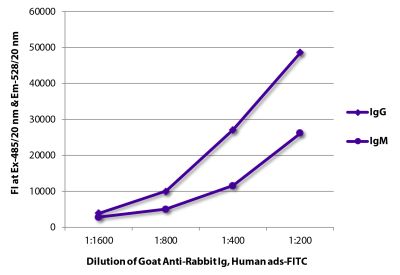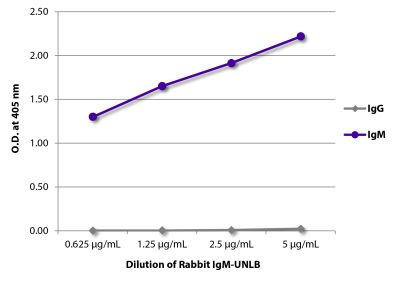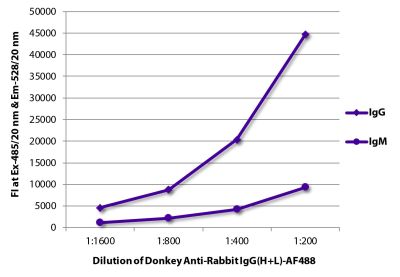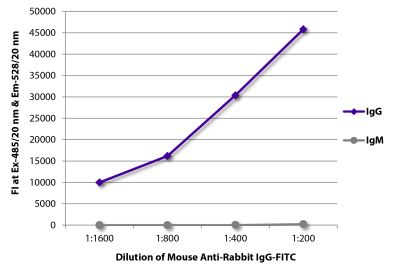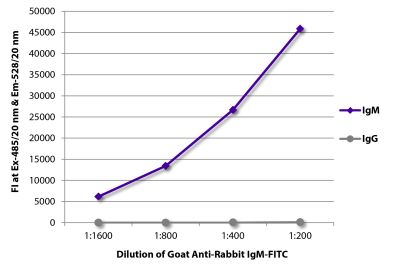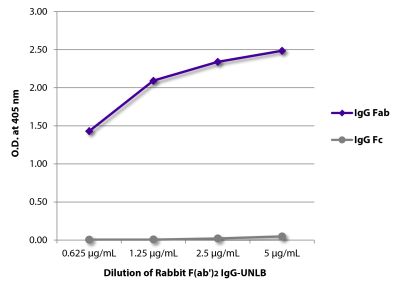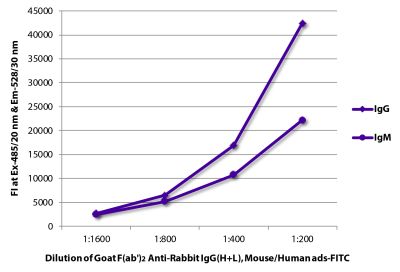Donkey Anti-Rabbit IgG(H+L), Mouse/Rat/Human SP ads-AF488
Cat. No.:
6440-30
Donkey Anti-Rabbit IgG(H+L)-Alexa Fluor® 488 antibody with minimal reactivity to human, mouse, and rat serum proteins for use in flow cytometry, immunohistochemistry / immunocytochemistry, and western blot assays.
$272.00
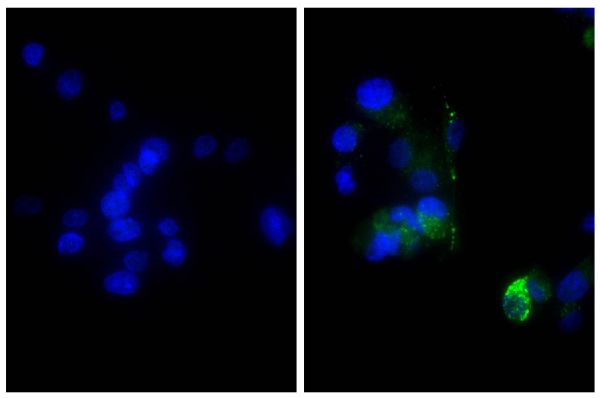



| Isotype | Donkey IgG |
|---|---|
| Isotype Control | 0175-30 |
| Specificity | Reacts with the heavy and light chains of rabbit IgG and the light chains of rabbit IgM |
| Source | Pooled antisera from donkeys hyperimmunized with rabbit IgG |
| Cross Adsorption | Mouse, rat, and human serum proteins (SP); may react with immunoglobulins from other species and the light chains of other rabbit immunoglobulins |
| Purification Method | Affinity chromatography on rabbit IgG covalently linked to agarose |
| Conjugate | AF488 (Alexa Fluor® 488) |
| Buffer Formulation | Phosphate buffered saline containing < 0.1% sodium azide |
| Clonality | Polyclonal |
| Concentration | 1.0 mg/mL |
| Volume | 1.0 mL |
| Recommended Storage | 2-8°C; Avoid exposure to light |
| Trademark Information | Alexa Fluor® is a registered trademark of Thermo Fisher Scientific, Inc. or its subsidiaries |
| Applications |
Quality tested applications for relevant formats include - ELISA 1 FLISA Other referenced applications for relevant formats include - Flow Cytometry 2,3 Immunohistochemistry-Paraffin Sections 4,5 Immunocytochemistry 6 Western Blot 7,8 |
| RRID Number | AB_2796368 |
Documentation
Certificate of Analysis Lookup
Enter the Catalog Number and Lot Number for the Certificate of Analysis you wish to view
- 1. Bréhin A, Mouriès J, Frenkiel M, Dadaglio G, Desprès P, Lafon M, et al. Dynamics of immune cell recruitment during West Nile encephalitis and identification of a new CD19+B220-BST-2+ leukocyte population. J Immunol. 2008;180:6760-7. (ELISA)
- 2. So L, Yea SS, Oak JS, Lu M, Manmadhan A, Ke QH, et al. Selective inhibition of phosphoinositide 3-kinase p110 α preserves lymphocyte function. J Biol Chem. 2013;288:5718-31. (FC)
- 3. Limon JJ, So L, Jellbauer S, Chiu H, Corado J, Sykes SM, et al. mTOR kinase inhibitors promote antibody class switching via mTORC2 inhibition. Proc Natl Acad Sci USA. 2014;111:E5076-85. (FC)
- 4. Deckert V, Kretz B, Habbout A, Raghay K, Labbé J, Abello N, et al. Development of abdominal aortic aneurysm is decreased in mice with plasma phospholipid transfer protein deficiency. Am J Pathol. 2013;183:975-86. (IHC-PS)
- 5. Zou Z, Bellenger S, Massey KA, Nicolaou A, Geissler A, Bidu C, et al. Inhibition of the HER2 pathway by n-3 polyunsaturated fatty acids prevents breast cancer in fat-1 transgenic mice. J Lipid Res. 2013;54:3453-63. (IHC-PS)
- 6. Schulte JH, Lindner S, Bohrer A, Maurer J, De Preter K, Heukamp L, et al. MYCN and ALKF1174L are sufficient to drive neuroblastoma development from neural crest progenitor cells. Oncogene. 2013;32:1059-65. (ICC)
- 7. Rasley A, Marriott I, Halberstadt CR, Bost KL, Anguita J. Substance P augments Borrelia burgdorferi-induced prostaglandin E2 production by murine microglia. J Immunol. 2004;172:5707-13. (WB)
- 8. Hadler-Olsen E, Kanapathippillai P, Berg E, Svineng G, Winberg J, Uhlin-Hansen L. Gelatin in situ zymography on fixed, paraffin-embedded tissue: zinc and ethanol fixation preserve enzyme activity. J Histochem Cytochem. 2010;58:29-39. (WB)
See All References


